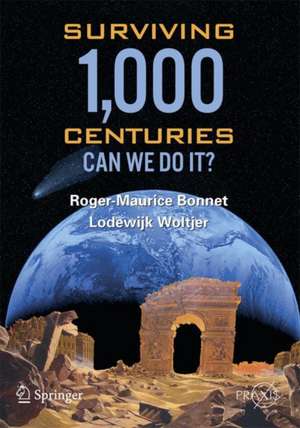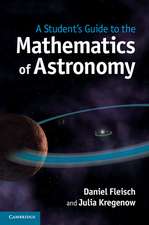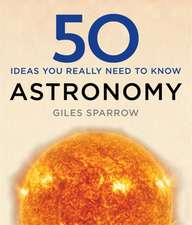Surviving 1000 Centuries: Can We Do It?: Springer Praxis Books
Autor Roger-Maurice Bonnet, Lodewyk Woltjeren Limba Engleză Hardback – 10 sep 2008
The authors consider both cosmic and natural hazards, pointing out that scientific information provided by satellites and communication systems on the ground could prevent many unnecessary casualties by forward planning and the installation of elementary precautions. The Earth’s evolving climate is considered, showing how greenhouse gases have played an important role in the past climate, whereas human industrial and agricultural emissions will greatly impact our future.
Din seria Springer Praxis Books
-
 Preț: 294.46 lei
Preț: 294.46 lei -
 Preț: 223.45 lei
Preț: 223.45 lei -
 Preț: 193.12 lei
Preț: 193.12 lei -
 Preț: 167.85 lei
Preț: 167.85 lei -
 Preț: 288.98 lei
Preț: 288.98 lei -
 Preț: 323.74 lei
Preț: 323.74 lei -
 Preț: 401.38 lei
Preț: 401.38 lei -
 Preț: 264.12 lei
Preț: 264.12 lei - 8%
 Preț: 513.00 lei
Preț: 513.00 lei -
 Preț: 190.01 lei
Preț: 190.01 lei -
 Preț: 218.16 lei
Preț: 218.16 lei -
 Preț: 312.06 lei
Preț: 312.06 lei - 17%
 Preț: 414.05 lei
Preț: 414.05 lei -
 Preț: 216.41 lei
Preț: 216.41 lei -
 Preț: 262.27 lei
Preț: 262.27 lei -
 Preț: 264.35 lei
Preț: 264.35 lei -
 Preț: 167.63 lei
Preț: 167.63 lei -
 Preț: 284.81 lei
Preț: 284.81 lei -
 Preț: 259.08 lei
Preț: 259.08 lei -
 Preț: 305.47 lei
Preț: 305.47 lei -
 Preț: 244.14 lei
Preț: 244.14 lei -
 Preț: 227.85 lei
Preț: 227.85 lei -
 Preț: 285.25 lei
Preț: 285.25 lei -
 Preț: 295.56 lei
Preț: 295.56 lei -
 Preț: 357.17 lei
Preț: 357.17 lei -
 Preț: 275.79 lei
Preț: 275.79 lei -
 Preț: 257.08 lei
Preț: 257.08 lei -
 Preț: 349.71 lei
Preț: 349.71 lei -
 Preț: 272.45 lei
Preț: 272.45 lei -
 Preț: 270.27 lei
Preț: 270.27 lei - 8%
 Preț: 456.51 lei
Preț: 456.51 lei -
 Preț: 352.34 lei
Preț: 352.34 lei - 8%
 Preț: 394.80 lei
Preț: 394.80 lei -
 Preț: 320.65 lei
Preț: 320.65 lei -
 Preț: 325.29 lei
Preț: 325.29 lei -
 Preț: 253.11 lei
Preț: 253.11 lei -
 Preț: 192.86 lei
Preț: 192.86 lei -
 Preț: 313.40 lei
Preț: 313.40 lei -
 Preț: 150.51 lei
Preț: 150.51 lei -
 Preț: 233.34 lei
Preț: 233.34 lei -
 Preț: 286.78 lei
Preț: 286.78 lei -
 Preț: 212.01 lei
Preț: 212.01 lei -
 Preț: 366.83 lei
Preț: 366.83 lei -
 Preț: 299.99 lei
Preț: 299.99 lei -
 Preț: 232.27 lei
Preț: 232.27 lei -
 Preț: 284.58 lei
Preț: 284.58 lei -
 Preț: 212.45 lei
Preț: 212.45 lei -
 Preț: 159.81 lei
Preț: 159.81 lei -
 Preț: 349.48 lei
Preț: 349.48 lei - 20%
 Preț: 2061.64 lei
Preț: 2061.64 lei
Preț: 336.44 lei
Nou
Puncte Express: 505
Preț estimativ în valută:
64.40€ • 69.97$ • 54.13£
64.40€ • 69.97$ • 54.13£
Carte tipărită la comandă
Livrare economică 17-23 aprilie
Preluare comenzi: 021 569.72.76
Specificații
ISBN-13: 9780387746333
ISBN-10: 0387746331
Pagini: 422
Ilustrații: XXVI, 422 p.
Dimensiuni: 170 x 240 x 28 mm
Greutate: 1 kg
Ediția:2008
Editura: Springer
Colecția Praxis
Seriile Springer Praxis Books, Popular Science
Locul publicării:New York, NY, United States
ISBN-10: 0387746331
Pagini: 422
Ilustrații: XXVI, 422 p.
Dimensiuni: 170 x 240 x 28 mm
Greutate: 1 kg
Ediția:2008
Editura: Springer
Colecția Praxis
Seriile Springer Praxis Books, Popular Science
Locul publicării:New York, NY, United States
Public țintă
Popular/generalCuprins
A Brief History of the Earth.- Cosmic Menaces.- Terrestrial Hazards.- The Changing Climate.- Climate Futures.- The Future of Survivability: Energy and Inorganic Resources.- The Future of Survivability: Water and Organic Resources.- Leaving Earth: From Dreams to Reality?.- Managing the Planet’s Future: The Crucial Role of Space.- Managing the Planet’s Future: Setting-Up the Structures.- Conclusion.
Recenzii
From the reviews:
"A good initial feeling for the thesis of the book can be obtained simply by reading the … chapters. … the authors turn to threats to survival from outside (from nearby supernovae to asteroid impact) and from inside (disease, seismic events, and climatic hazards), before turning to the current burning issue of climate change, both past and future. … This is a fascinating and challenging book which is published at just the right moment. It should be required reading for all politicians … ." (Robert Connon Smith, The Observatory, Vol. 129 (1210), June, 2009)
"A good initial feeling for the thesis of the book can be obtained simply by reading the … chapters. … the authors turn to threats to survival from outside (from nearby supernovae to asteroid impact) and from inside (disease, seismic events, and climatic hazards), before turning to the current burning issue of climate change, both past and future. … This is a fascinating and challenging book which is published at just the right moment. It should be required reading for all politicians … ." (Robert Connon Smith, The Observatory, Vol. 129 (1210), June, 2009)
Notă biografică
Dr R M Bonnet and Dr L Woltjer are outstanding, internationally renowned scientists. During his long tenure at the European Space Agency, Dr Bonnet has directed the launch of 17 artificial scientific satellites, initiating the development of the Huygens probe placed on the NASA Cassini Saturn Orbiter which landed on Titan on 14 January 2005, developing the successful Mars Express mission and directing the SMART-1 European lunar mission. He is President of COSPAR and Executive Director of ISSI and has acquired a world reputation in the field of space politics. After 11 years at Columbia University, NY, Dr Woltjer returned to Europe as Director General of ESO for 13 years. Since then he has worked closely with the Observatories de Haute Provence in France and the University of Florence in Italy, was President of the International Astronomical Union and Chairman of the Space Science Advisory Committee of ESA for 4 years.
Caracteristici
Reviews the physical conditions for survival of life on Earth over the next 1000 centuries Analyses the interacting factors affecting the sustainability of Earth’s natural resources Stresses the need for active management of Earth's resources in the 21st century to ensure long-term survival Highlights the influence of observations from space on the technical, scientific and political tools for survivability











